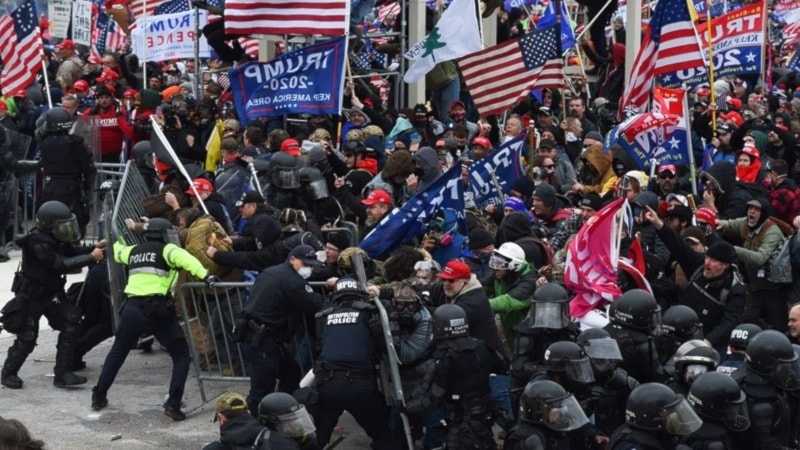US admits to surveillance of its citizens, sparks outrage
The US Treasury Department's disclosure marks the first official confirmation of the Biden Administration's tracking of keyword searches in the aftermath of the January 6 riot.
-

Trump supporters clash with US police and security forces as they push barricades to storm the US capitol, on January 6, 2021. (AFP)
The Biden Administration has acknowledged monitoring the private financial transactions of Americans, targeting keywords like "MAGA", "Trump", and "Kamala" in the aftermath of the January 6 riots.
Federal investigators, operating within the Treasury's Financial Crimes Enforcement Network (FinCEN), directed banks to scrutinize records of potential "extremists".
According to a letter from the Treasury Department to Senator Tim Scott, the "surveillance initiative", labeled as "Exchange events", commenced shortly after January 6, 2021. Initiated under the previous Administration, the program encompassed the monitoring of users who use terms like "Antifa", "MAGA", "Trump", "Biden", "Kamala", "Schumer", and "Pelosi".
The US government reportedly monitored Trump supporters, customers of outdoor stores like Cabela's, Dick's Sporting Goods, and Bass Pro Shops, as well as individuals purchasing religious texts, including the Bible.
This official release marks the first confirmation of the Biden Administration's utilization of keyword searches in the aftermath of the January 6 riot.
Dive deeper
Acting Assistant Secretary Corey Tellez signed the response to Senator Tim Scott who is currently part of the Senate Banking Committee. Scott had earlier sent a letter to the Secretary of the Treasury Janet Yellen, demanding answers.
Scott expressed concerns about the program, deeming it a "flagrant violation of Americans' privacy" and an unjust targeting of citizens without due process.
Despite Scott's prior support for the 2020 Anti-Money Laundering Act, enabling the FinCEN Exchange program, the action to survey citizens raised questions about privacy and constitutional rights. FinCEN provided materials to banks, advising them to search and filter private finance records using specific keywords, a practice criticized for potential privacy infringements.
The purpose of the controversial actions was to allegedly assist law enforcement in identifying individuals of interest in anticipation of Biden's inauguration on January 20, 2021, and in the aftermath of the January 6 riots.
The discovery of these searches occurred during an investigation by the House Judiciary Committee and Subcommittee on the Weaponization of the Federal Government. Uncovered documents revealed that FinCEN cautioned financial institutions about an "extremism indicator", including factors, such as the "purchase of books (including religious texts)" like the Bible and subscriptions to certain media with "extremist views". The report by Judiciary Chairman Jim Jordan, R-Ohio, released in January, highlighted that the department suggested searching for terms like "MAGA" and "Trump" in Zelle payments.
"Did you shop at Bass Pro Shop yesterday or purchase a Bible? If so, the federal government may be watching you," Jordan said in a post on X at the time.
"We now know the federal government flagged terms like 'MAGA' and 'TRUMP,' to financial institutions if Americans completed transactions using those terms," he said in another post.
"What was also flagged? If you bought a religious text, like a BIBLE, or shopped at Bass Pro Shop," he stressed.
Furthermore, officials cautioned banks about "extremism" indicators, such as buying a bus or plane ticket "for travel to areas with no apparent purpose" or acquiring a religious text like a Bible, as revealed in documents.
The Treasury's materials instructed financial institutions to consider subscriptions to news outlets with "extremist" views as another indicator for scrutiny.
The release of the report triggered significant criticism of the Biden administration, with Republicans seeking explanations about the government's surveillance methods.
In a Senate Banking Committee hearing on Thursday, Republican Senator Scott criticized the Treasury secretary over the surveillance instructions.
"FinCEN was created to stop money laundering and not to spy on Americans," he stated, highlighting, "It was not created for political motivations."
Read more: US government’s purchase, use of Israeli spyware to be investigated

 4 Min Read
4 Min Read








